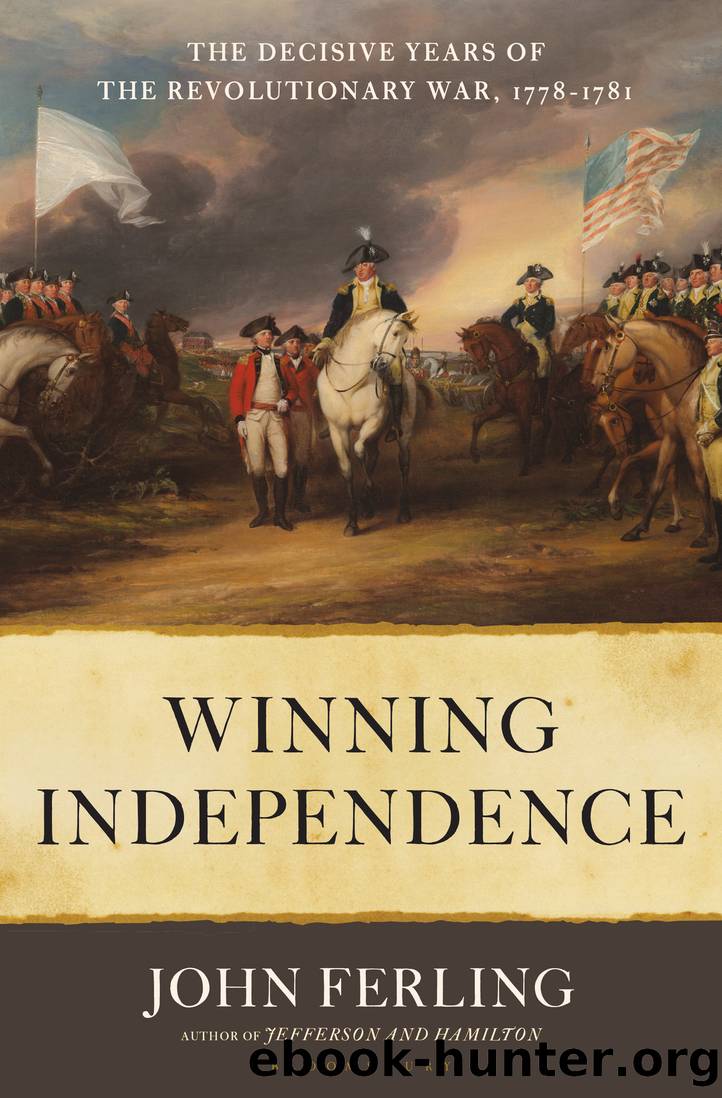Winning Independence by John Ferling

Author:John Ferling [Ferling, John]
Language: eng
Format: epub
CHAPTER 10
FATEFUL CHOICES
General Washington had last seen Nathanael Greene in October. What he had heard from Greene following his arrival in North Carolina, communiqués penned in December that were weeks old by the time they reached the commander, had not been encouraging. Greene had not been sure his army deserved to be called an army. He advised Washington that the southern states had provided only a few poorly equipped militiamen and that the countryside had been âlaid wasteâ both by winter and militia that had remained on active duty during the last six months. So barren was the region, said Greene, that his army would have to remain on the move foraging for provisions. His only cheery news was that both the partisans and Colonel Washingtonâs cavalry were having some success in harassing the enemy. Greene had also divulged his unorthodox plan to divide his army, a step that Washington, and perhaps Washington alone, regarded as being âsupported upon just Military Principles.â1
Washington, who two years earlier had looked on the war in the South as an inconsequential sideshow, now saw things differently. Given the devastating defeats at Charleston and Camden, and the arrival of a British army under Arnold in Virginia, Washington now understood that Britain might have the means of suppressing the rebellion in three southern provinces, an outcome that would be fatal to the quest for independence. He looked on Henry Clintonâs decision to dispatch Arnold as a clever stroke. Given Britainâs naval superiority, Washington understood that Clinton was pursuing a game plan that could result in a deadly threat to Greene. Arnoldâs army could block the flow of supplies to the southern army, pin down Virginiaâs militia so that it could not assist Greene, and possibly join with Cornwallis in a campaign to snare the rebel army.2
Washington wrote Governors Nash and Jefferson, gently chiding the former for North Carolinaâs failure to meet its manpower quota for the Continental army or to furnish adequately supplied militia forces. He appealed to Jefferson to see the bigger picture. He told Virginiaâs governor that Britainâs âpredatory incursionsâ into the Old Dominion were damaging and dispiriting, but he counseled that the greater danger to realizing independence lay in the lower South. Virginia, Washington added, must provide ample assistance to Greene to assure that Cornwallis was denied victory.3
Now fully engaged with regard to the grave dangers posed by Britainâs southern strategy, Washington, in December, had approached General Rochambeau about sending men and a fleet to the South, either to destroy Arnold in Virginia or assail the British in Charleston. Washington intimated that the United States would never agree to a peace settlement until the British ârelinquish their conquests in South Carolina and Georgia.â Washington, like Clinton and the French leaders, understood that the key to breaking the stalemate rested with naval superiorityââhow might the enemy be crushed if we had it,â he wistfully remarked to one of his young officersâbut the question remained: Would it be Britainâs navy or Franceâs that was instrumental in the decisive action.
Download
This site does not store any files on its server. We only index and link to content provided by other sites. Please contact the content providers to delete copyright contents if any and email us, we'll remove relevant links or contents immediately.
| Africa | Americas |
| Arctic & Antarctica | Asia |
| Australia & Oceania | Europe |
| Middle East | Russia |
| United States | World |
| Ancient Civilizations | Military |
| Historical Study & Educational Resources |
The Dawn of Everything by David Graeber & David Wengrow(1698)
The Bomber Mafia by Malcolm Gladwell(1620)
Facing the Mountain by Daniel James Brown(1548)
Submerged Prehistory by Benjamin Jonathan; & Clive Bonsall & Catriona Pickard & Anders Fischer(1452)
Wandering in Strange Lands by Morgan Jerkins(1420)
Tip Top by Bill James(1409)
Driving While Brown: Sheriff Joe Arpaio Versus the Latino Resistance by Terry Greene Sterling & Jude Joffe-Block(1372)
Red Roulette : An Insider's Story of Wealth, Power, Corruption, and Vengeance in Today's China (9781982156176) by Shum Desmond(1354)
Evil Geniuses: The Unmaking of America: A Recent History by Kurt Andersen(1347)
The Way of Fire and Ice: The Living Tradition of Norse Paganism by Ryan Smith(1330)
American Kompromat by Craig Unger(1308)
It Was All a Lie by Stuart Stevens;(1296)
F*cking History by The Captain(1294)
American Dreams by Unknown(1278)
Treasure Islands: Tax Havens and the Men who Stole the World by Nicholas Shaxson(1267)
Evil Geniuses by Kurt Andersen(1251)
White House Inc. by Dan Alexander(1207)
The First Conspiracy by Brad Meltzer & Josh Mensch(1168)
The Fifteen Biggest Lies about the Economy: And Everything Else the Right Doesn't Want You to Know about Taxes, Jobs, and Corporate America by Joshua Holland(1119)
